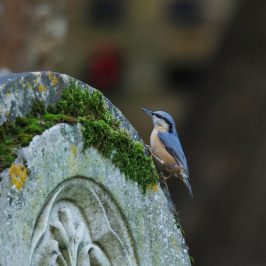This was my first Eupeodes of the season, and I was pleased to have my identification confirmed by the hoverfly recorders, because male Eupeodes are tricky, and can’t always be taken to species. We have nine of these species in the UK – three of them very common in open grassy habitats, while the others are rarer and generally associated with woodland – but there are at least another dozen in continental Europe. All of the adults feed on nectar and pollen, but the larvae are aphidophagous, and for this reason some sources refer to the genus as the Aphideaters.
This is Eupeodes latifasciatus, which is believed to be at least partially migrant because its abundance varies from year to year, though this male will be home-bred. It’s fairly small, the wing length averaging 7.5mm, and the yellow abdominal markings are quite variable, from spots through to continuous bands. The yellow “spectacle” marks here, separated from the edges of the abdomen by distinct black margins, are suggestive, though to be completely certain of what you were dealing with you’d need to microscopically examine the wings and genitalia. It prefers damp meadows and woodland edges, which pretty accurately describes my garden right now.
My second photo tonight is a male drone fly (Eristalis pertinax) licking his own armpits – and which of us can honestly say that we’ve never wanted to do that?








